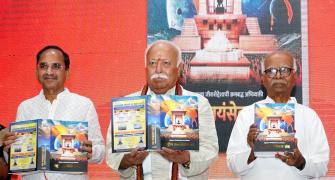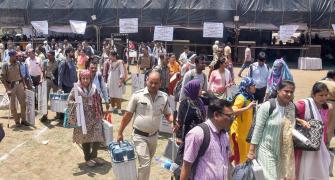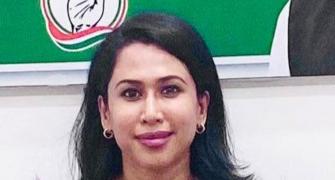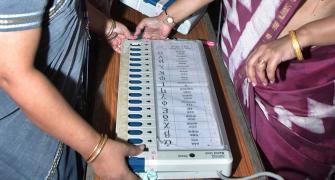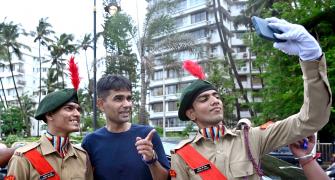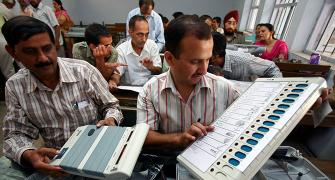Managing Editor Sheela Bhatt provides an inside view of the behind-the-scenes wheeling and dealing that culminated in the trust vote in Parliament last week.
"The glamour of winning the confidence vote in Parliament has been diluted because of this scam by the Samajwadi Party," said a Congress minister of the United Progressive Alliance government who was involved in managing the party's strategy during the two-day special session of Parliament.
He was referring to the cash-for-votes scam, wherein on the evening of July 22, shortly before Prime Minister Dr Manmohan Singh was due to respond to the debate, three Bharatiya Janata Party Members of Parliament carried bags full of currency into Parliament, and claimed that a senior SP leader had bribed them to vote on behalf of the government coalition.
Prime Minister Dr Singh, Congress party president Sonia Gandhi and general secretary Rahul Gandhi preferred to ignore the scam, and were seen at their cheerful best at the get-together at on Sonia's residence at 10 Janpath, where Dr Singh was hailed the 'super PM'.
The goal was reached, but not without considerable energy and effort to navigate the dark bylanes of New Delhi's political world. While the spotlight is on the Congress and by extension the UPA, the fact is that outside of the Left parties and a few other marginal players, every party involved in either side of the debate spent the days leading up to the vote in extensive wheeling-dealing.
A Congress insider, who was one of the crack team fielded to ensure a UPA win, Dr Singh had in June given an ultimatum to his party that he would not attend the G-8 meeting in Japan unless his party and its president backed gave him the green light on the United States-India civilian nuclear cooperation agreement.
Dr Singh, to his credit, had adroitly put his party in an advantageous position by ensuring a tie up with the Samajwadi Party, that netted the UPA the support of 37 MPs. His team had been working on SP leader Mulayam Singh Yadav and general secretary Amar Singh ever since Mayawati took oath as chief minister of Uttar Pradesh in 2007.
The political masterstroke was reluctantly accepted by senior Congressmen chronically allergic to Amar Singh and his reputation for demanding several pounds of flesh at every opportunity.
Ironically, the Left parties contributed considerably strengthening Dr Singh's position. Their opposition to all forms of economic liberalisation had miffed many senior members of the Congress, who considered the party was being shackled by the Left intransigence, and the prospect of finally ending the UPA's dependence on the Left proved an attractive proposition to even those who were opposed to pushing ahead with the nuclear deal.
The early math seemed to favour the UPA: It had 226 MPs, the SP had 37 [two SP rebels. Raj Babbar and Beni Prasad Varma, had already joined the Congress], the Jharkhand Mukti Morcha had five MPs, Janata Dal-Secular's three MPs, and four independent MPs out of six gave the ruling coalition 275 seats, and a comfortable win.
The Congress formed a team under External Affairs Minister Pranab Mukherjee to manage the majority. The team, comprising Parliamentary Affairs Minister Vayalar Ravi, Congress president Sonia Gandhi's political secretary Ahmed Patel, Minister of State in the Prime Minister's Office Prithviraj Chavan and Defence Minister A K Antony met at Mukherjee's home at 11, Talkatora Road to exchange information and monitor the situation. It was assisted by Congress chief ministers like Vilasrao Deshmukh (Maharashtra), Y S Rajshekhar Reddy (Andhra Pradesh) and Bhupendra Singh Hooda (Punjab), and former Punjab CM Amrinder Singh, who got one Akali Dal MP into the UPA fold.
Agriculture Minister Sharad Pawar of the Nationalist Congress Party (11 MPs), Railway Minister Lalu Prasad Yadav of the Rashtriya Janata Dal (24 MPs), Minister for Chemicals and Fertilisers Ram Vilas Paswan of the Lok Jana Shakti Party (4 MPs), Health Minister Dr Anbumani Ramadoss of the Dravida Munnetra Kazhagham (16 MPs) and Shipping Minister T R Baalu also of the DMK, all constituents of the UPA coalition, were contacted on a daily basis, to ensure against defections from the ranks.
The game changed when Uttar Pradesh Chief Minister and Bahujan Samaj Party president Mayawati entered the fray. Her entry was prompted by a genuine apprehension that the SP, by saving the UPA government, would be able to extract enormous concessions from the government in New Delhi.
Mayawati's moves were swift, and smart. With full backing of Communist Party of India-Marxist general secretary Prakash Karat, Mayawati played the communal card in Uttar Pradesh, calling the nuclear deal anti-Muslim. She showed a readiness to offer tickets for the next Lok Sabha elections, thus encouraging defectors from the UPA.
The results were immediate: SP MPs Munawwar Hasan and Jai Prakash Rawat defected almost immediately. And once the SP fortress was breached, the Congress and its allies panicked.
Self-preservation is always the name of the political game, and the panic spread to some Congress MPs who wanted to ensure that they would get tickets for the next election. They began putting pressure on the party hierarchy, and entailed that they be kept under strict observation to ensure against defection.
There was also the problem of Minister of State for Information and Broadcasting M H Ambareesh, who had not been attending office for 18 months in protest against the Cauvery water allocation, and who was now believed to be reluctant to come to New Delhi to vote for the government. Karnataka Congress convenor D K Shivkumar was deputed to work full time to ensure that the reluctant minister arrived in Delhi in time.
Elsewhere, Haryana MP Arvind Sharma came out against the Congress -- and suddenly, the UPA's arithmetic was shot to bits. Panic spread, fuelled by media hype that Mayawati was a heartbeat away from the prime ministership.
The key remained the SP. When Dr Singh's team had negotiated with the party, Amar Singh had promised 37 MPs from his party. Following the two defections, it was no longer clear what number the SP would finally manage.
The Congress then unveiled Plan B -- to search for and snaffle soft targets among the opposition. Inside sources say the party first looked towards the north-east and its small, unaffiliated parties. Simultaneously, Deshmukh worked on the Shiv Sena and BJP MPs in Maharashtra, while Rajshekhar Reddy was given the responsibility of snaring Telugu Desam Party MPs in Andhra Pradesh. Hooda was told to make sure that the dissident Sharma voted for the Congress. Mukherjee and Patel were deputed to supervise this effort.
A week before the vote, Sonia's permission was sought to call a meeting of around two dozen party convenors, who were then assigned the task of ensuring that the Congress MPs didn't stray. Malcontents were kept in check with the promise of tickets; party insiders say some of them, as for instance R L Jalappa of Karnataka, were even taken to meet Sonia Gandhi and get her personal assurance.
The Congress, SP and BSP were totally amoral in their various bids to get MPs to switch sides or to abstain. The BJP, meanwhile, handled this part of the game badly -- with the result that eight of their MPs [including four from Karnataka, where the party had just won an important state electoral victory] switched sides in defiance of the party whip.
Ironically, the BJP's anticipation of the coming elections, in which it hopes to regain power, contributed to its downfall in the vote. The party had carried out a survey of all the Lok Sabha constituencies, and thus its MPs knew their chances of getting a nomination or not and those who knew their chances were dim were ripe to fall into the UPA's hands.
Another fertile hunting ground for the horse traders was among that group of MPs who, thanks to the delimitation exercise, have lost their existing constituencies and have to now look for new ones.
The incidents, involving the JMM, were perhaps most indicative of the skulduggery in the national capital. The JMM was an important constituent of the UPA, with five MPs. Had they switched sides, it was game over for the Congress. Knowing this, JMM leader Shibu Soren began pressing a hard bargain.
Senior BJP leader Sushma Swaraj tried to take advantage of the situation, flying to Kolkata to meet with Soren and offer him the Jharkhand chief minister's post if he ditched the UPA.
The Congress brought in Jharkhand chief minister Madhu Koda as pinch hitter; he persuaded three JMM MPs to ditch Soren, and to negotiate directly with the Congress.
Once the BJP realised that Soren could not bring his five MPs with him, his utility for the BJP was at an end. The Congress then moved in, promised him the coal ministry, and secured his vote.
The Congress successfully poached Audikesavulu, the billionaire liquor baron and TDP MP who is a close friend of UB Group chairman Vijay Mallya. It proved a prize catch, since Audikesavulu is close to TDP chief Chandrababu Naidu, who had given up his own constituency for his friend.
Audikesavulu abstained, largely because his business interests had been affected with the TDP out of power, and he was looking for new allies. M Jagannathan of the TDP also defected.
That was merely the beginning of the drama. After the vote, Women and Child Welfare Minister Renuka Chaudhary took Jagannathan over to introduce him to Sonia Gandhi, who along with Prime Minister Dr Singh greeted him warmly and thanked him for his support.
Jagannathan then attempted to leave the House, but the main doors of the Lok Sabha were closed for the voting. TDP leader in the House Yerran Naidu noticed on the electronic board that two of his MPs had defied the party whip, and rushed to get hold of them.
Naidu forced Jagnnathan to sign a slip changing his vote, but Speaker Somnath Chatterjee turned it down -- MPs are allowed to change their preferences, but not after the votes have been counted.
Naidu prevented his defectors from leaving the House, and tension mounted, with Congress MP Madhu Yakshi coming over to the aid of the TDP defectors.
In the end, the combined efforts of the Congress and the SP helped the UPA secure the defections of 14 MPs who voted in favour. Six SP MPs defied their party's mandate, however, underlining the very real threat Mayawati's poaching efforts had held out.
When the cash-for-votes scam broke, Deshmukh told rediff that "The BJP knew all the while that they don't have numbers, so they are making baseless allegations."
That is the party line, but it is not quite accurate: had all MPs voted according to the diktats of their respective parties, the final tally would have read 261 'for', and '277' against.
Put baldly, had the democratic process run its course without interference, the UPA would have lost the trust vote and, with it, the mandate for the US-India nuclear deal.
As it stands, however, the Congress and its allies are triumphant. Not only has the win been interpreted as a vote on behalf of the nuclear deal, the Congress has managed to shake off the baggage of the Left, and can in the time remaining in its tenure push hard for reforms, thus restoring some confidence in its government. Plus, if it can actually pull off some major, market-pleasing reforms, it can then claim that it could have done much more, but for the Left's constant interference.
"Our party activists in the states think we have won an election," Vayalar Ravi said.
Ironically, the biggest loser has been the BJP. When the Left pulled out, the BJP was not quite committed to toppling the government; it believed at the time that the numbers were weighted for the UPA.
It was only when Mayawati entered the picture that the BJP got active and even then, analysts say, the BJP was in a bind because had it succeeded in helping to topple the UPA, it would merely have paved the way for the rise of Mayawati as prime minister.
Uttar Pradesh is a politically crucial state in the coming Lok Sabha elections; the BJP had to think long and hard whether it wanted to go to that state while its currently unquestioned queen ruled New Delhi.
A Congress MP from the Rajya Sabha underlined the futility of the trust vote exercise, when he pointed out that before the vote, the UPA was clearly a minority government. "After all this saudabazi [horse-trading], Dr Singh has got political legitimacy," the MP argued. "It is not a small deal."


